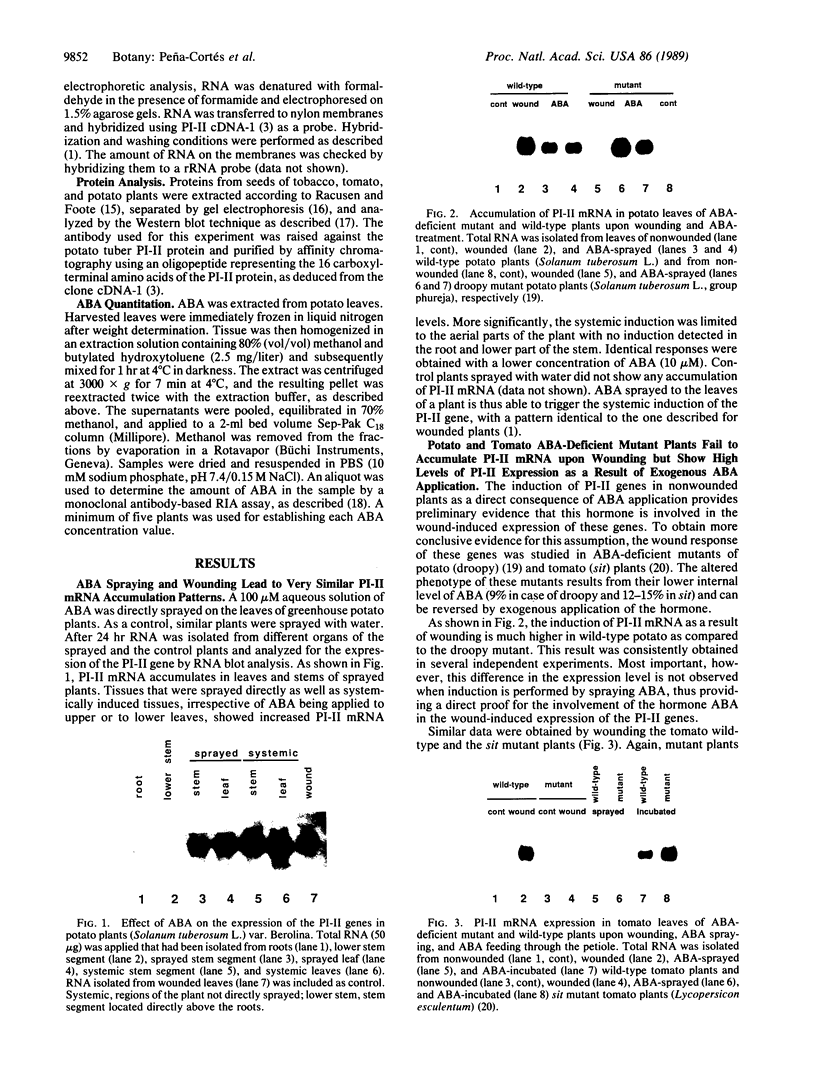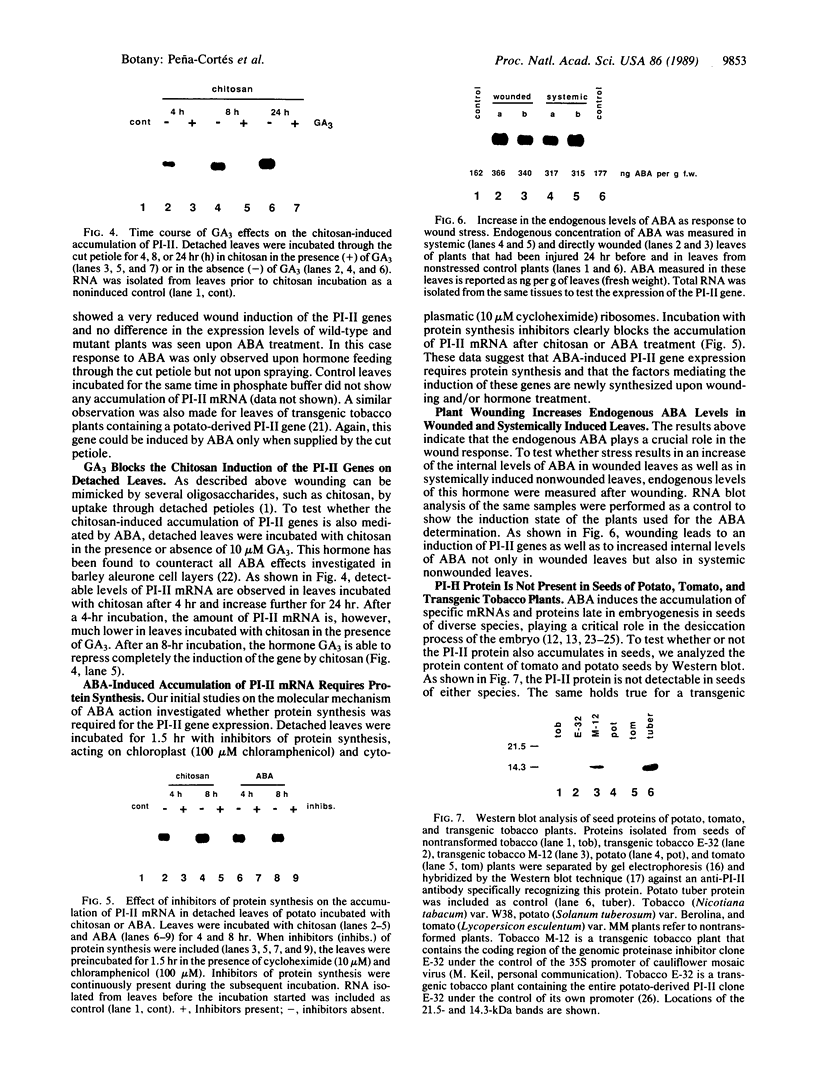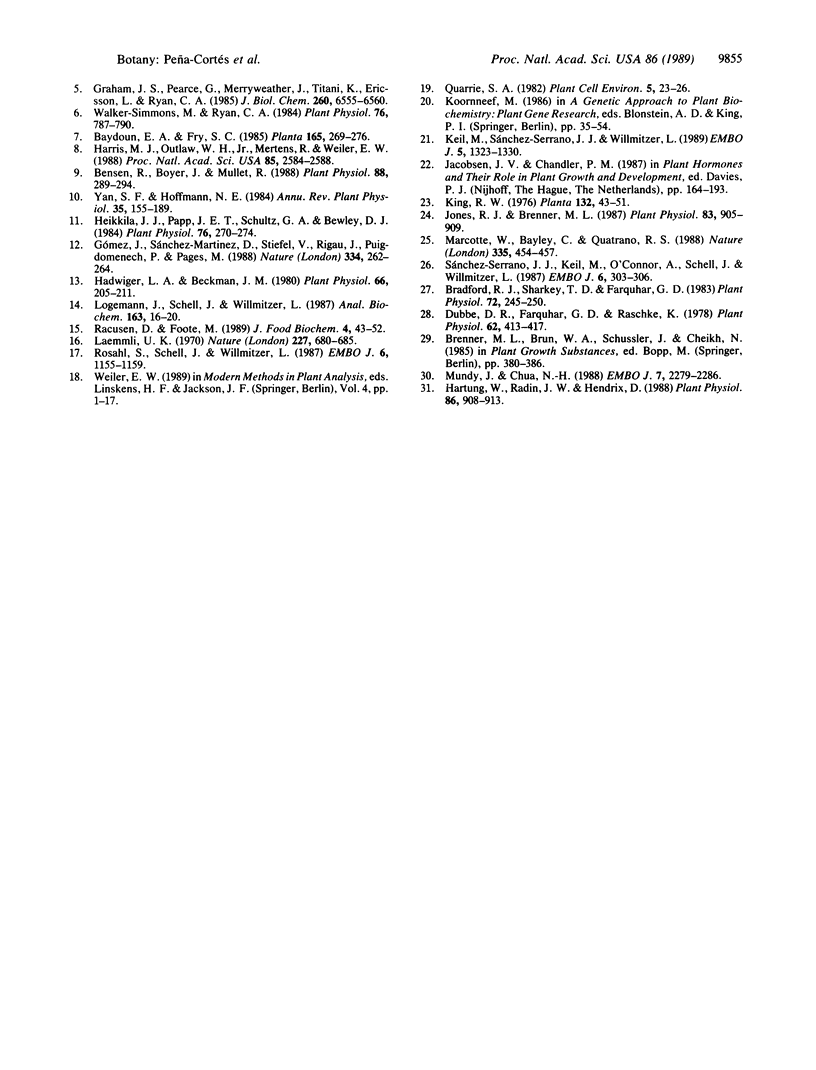Abstract
Plants respond to wounding or pathogen attack by a variety of biochemical reactions, involving in some instances gene activation in tissues far apart from the actual site of wounding or pathogen invasion. One of the best analyzed examples for such a systemic reaction is the wound-induced expression of proteinase inhibitor genes in tomato and potato leaves. Local wounding of potato or tomato plants results in the accumulation of proteinase inhibitors I and II throughout the aerial part of the plant. In contrast to wild-type plants, abscisic acid-deficient mutants of potato (droopy) and tomato (sit) show a drastically reduced induction of these genes in response to plant wounding. High levels of proteinase inhibitor II gene expression are obtained in mutant and wild-type plants upon exogenous application of abscisic acid. Measurements of the endogenous abscisic acid levels in wild-type plants show that wounding results in increased levels of this phytohormone in wounded and nonwounded systemically induced leaves. Thus these results show that the plant hormone abscisic acid is involved in the wound-induced activation of the proteinase inhibitor II gene. Furthermore, they are compatible with a model assuming this hormone to be the actual mediator of the systemic wound response.
Full text
PDF




Images in this article
Selected References
These references are in PubMed. This may not be the complete list of references from this article.
- Bensen R. J., Boyer J. S., Mullet J. E. Water deficit-induced changes in abscisic Acid, growth, polysomes, and translatable RNA in soybean hypocotyls. Plant Physiol. 1988 Oct;88(2):289–294. doi: 10.1104/pp.88.2.289. [DOI] [PMC free article] [PubMed] [Google Scholar]
- Bradford K. J., Sharkey T. D., Farquhar G. D. Gas Exchange, Stomatal Behavior, and deltaC Values of the flacca Tomato Mutant in Relation to Abscisic Acid. Plant Physiol. 1983 May;72(1):245–250. doi: 10.1104/pp.72.1.245. [DOI] [PMC free article] [PubMed] [Google Scholar]
- Dubbe D. R., Farquhar G. D., Raschke K. Effect of abscisic Acid on the gain of the feedback loop involving carbon dioxide and stomata. Plant Physiol. 1978 Sep;62(3):413–417. doi: 10.1104/pp.62.3.413. [DOI] [PMC free article] [PubMed] [Google Scholar]
- Graham J. S., Pearce G., Merryweather J., Titani K., Ericsson L., Ryan C. A. Wound-induced proteinase inhibitors from tomato leaves. I. The cDNA-deduced primary structure of pre-inhibitor I and its post-translational processing. J Biol Chem. 1985 Jun 10;260(11):6555–6560. [PubMed] [Google Scholar]
- Green T. R., Ryan C. A. Wound-Induced Proteinase Inhibitor in Plant Leaves: A Possible Defense Mechanism against Insects. Science. 1972 Feb 18;175(4023):776–777. doi: 10.1126/science.175.4023.776. [DOI] [PubMed] [Google Scholar]
- Gómez J., Sánchez-Martínez D., Stiefel V., Rigau J., Puigdomènech P., Pagès M. A gene induced by the plant hormone abscisic acid in response to water stress encodes a glycine-rich protein. Nature. 1988 Jul 21;334(6179):262–264. doi: 10.1038/334262a0. [DOI] [PubMed] [Google Scholar]
- Hadwiger L. A., Beckman J. M. Chitosan as a Component of Pea-Fusarium solani Interactions. Plant Physiol. 1980 Aug;66(2):205–211. doi: 10.1104/pp.66.2.205. [DOI] [PMC free article] [PubMed] [Google Scholar]
- Harris M. J., Outlaw W. H., Mertens R., Weiler E. W. Water-stress-induced changes in the abscisic acid content of guard cells and other cells of Vicia faba L. leaves as determined by enzyme-amplified immunoassay. Proc Natl Acad Sci U S A. 1988 Apr;85(8):2584–2588. doi: 10.1073/pnas.85.8.2584. [DOI] [PMC free article] [PubMed] [Google Scholar]
- Hartung W., Radin J. W., Hendrix D. L. Abscisic Acid Movement into the Apoplastic solution of Water-Stressed Cotton Leaves: Role of Apoplastic pH. Plant Physiol. 1988 Mar;86(3):908–913. doi: 10.1104/pp.86.3.908. [DOI] [PMC free article] [PubMed] [Google Scholar]
- Heikkila J. J., Papp J. E., Schultz G. A., Bewley J. D. Induction of heat shock protein messenger RNA in maize mesocotyls by water stress, abscisic Acid, and wounding. Plant Physiol. 1984 Sep;76(1):270–274. doi: 10.1104/pp.76.1.270. [DOI] [PMC free article] [PubMed] [Google Scholar]
- Jones R. J., Brenner M. L. Distribution of Abscisic Acid in Maize Kernel during Grain Filling. Plant Physiol. 1987 Apr;83(4):905–909. doi: 10.1104/pp.83.4.905. [DOI] [PMC free article] [PubMed] [Google Scholar]
- Keil M., Sánchez-Serrano J. J., Willmitzer L. Both wound-inducible and tuber-specific expression are mediated by the promoter of a single member of the potato proteinase inhibitor II gene family. EMBO J. 1989 May;8(5):1323–1330. doi: 10.1002/j.1460-2075.1989.tb03512.x. [DOI] [PMC free article] [PubMed] [Google Scholar]
- Laemmli U. K. Cleavage of structural proteins during the assembly of the head of bacteriophage T4. Nature. 1970 Aug 15;227(5259):680–685. doi: 10.1038/227680a0. [DOI] [PubMed] [Google Scholar]
- Logemann J., Schell J., Willmitzer L. Improved method for the isolation of RNA from plant tissues. Anal Biochem. 1987 May 15;163(1):16–20. doi: 10.1016/0003-2697(87)90086-8. [DOI] [PubMed] [Google Scholar]
- Mundy J., Chua N. H. Abscisic acid and water-stress induce the expression of a novel rice gene. EMBO J. 1988 Aug;7(8):2279–2286. doi: 10.1002/j.1460-2075.1988.tb03070.x. [DOI] [PMC free article] [PubMed] [Google Scholar]
- Rosahl S., Schell J., Willmitzer L. Expression of a tuber-specific storage protein in transgenic tobacco plants: demonstration of an esterase activity. EMBO J. 1987 May;6(5):1155–1159. doi: 10.1002/j.1460-2075.1987.tb02348.x. [DOI] [PMC free article] [PubMed] [Google Scholar]
- Sanchez-Serrano J. J., Keil M., O'Connor A., Schell J., Willmitzer L. Wound expression of a potato proteinase inhibitor II gene in transgenic tobacco plants. EMBO J. 1987 Feb;6(2):303–306. doi: 10.1002/j.1460-2075.1987.tb04754.x. [DOI] [PMC free article] [PubMed] [Google Scholar]
- Walker-Simmons M., Ryan C. A. Proteinase inhibitor synthesis in tomato leaves : induction by chitosan oligomers and chemically modified chitosan and chitin. Plant Physiol. 1984 Nov;76(3):787–790. doi: 10.1104/pp.76.3.787. [DOI] [PMC free article] [PubMed] [Google Scholar]










